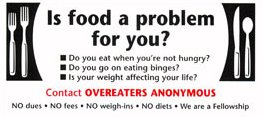What is OA?Overeaters Anonymous is a Fellowship of individuals who, through shared experience, strength and hope, are recovering from compulsive overeating. We welcome everyone who wants to stop eating compulsively.
There are no dues or fees for members; we are self-supporting through our own contributions, neither soliciting nor accepting outside donations. OA is not affiliated with any public or private organization, political movement, ideology or religious doctrine; we take no position on outside issues.
Our primary purpose is to abstain from compulsive overeating and to carry this message of recovery to those who still suffer.
Who belongs to OA?
In Overeaters Anonymous, you’ll find members who are extremely overweight, even morbidly obese; moderately overweight; average weight; underweight; still maintaining periodic control over their eating behavior; or totally unable to control their compulsive eating.
OA members experience many different patterns of food behaviors. These “symptoms” are as varied as our membership. Among them are:
obsession with body weight, size and shape
eating binges or grazing
preoccupation with reducing diets
starving
laxative or diuretic abuse
excessive exercise
inducing vomiting after eating
chewing and spitting out food
use of diet pills, shots and other medical interventions to control weight
inability to stop eating certain foods after taking the first bite
fantasies about food
vulnerability to quick-weight-loss schemes
constant preoccupation with food
using food as a reward or comfort
Our symptoms may vary, but we share a common bond: we are powerless over food and our lives are unmanageable. This common problem has led those in OA to seek and find a common solution in the
Twelve Steps, the
Twelve Traditions and
eight tools of Overeaters Anonymous.
How do OA members lose weight and maintain a healthy weight?
The concept of abstinence is the basis of OA’s program of recovery. By admitting inability to control compulsive eating in the past and abandoning the idea that all one needs is “a little willpower,” it becomes possible to abstain from overeating—one day at a time.
While a diet can help us lose weight, it often intensifies the compulsion to overeat. The solution offered by OA does not include diet tips. We don’t furnish diets, counseling services, hospitalization or treatment; nor does OA participate in or conduct research and training in the field of eating disorders. For weight loss, any medically approved eating plan is acceptable.
OA members interested in learning about nutrition or who seek professional advice are encouraged to consult qualified professionals. We may freely use such help, with the assurance that OA supports each of us in our efforts to recover.
What does OA offer?We offer unconditional acceptance and support through readily available OA meetings, which are self-supported through voluntary contributions.
We in OA believe we have a threefold illness—physical, emotional and spiritual. Tens of thousands have found that OA’s Twelve-Step program effects recovery on all three levels.
The Twelve Steps embody a set of principles which, when followed, promote inner change. Sponsors help us understand and apply these principles. As old attitudes are discarded, we often find there is no longer a need for excess food.
Those of us who choose to recover one day at a time practice the Twelve Steps. In so doing, we achieve a new way of life and lasting freedom from our food obsession.
Why is OA anonymous?
Anonymity allows the Fellowship to govern itself through principles rather than personalities. Social and economic status have no relevance in OA; we are all compulsive eaters. Anonymity at the level of press, radio, television and other media of communication provides assurance that OA membership will not be disclosed.
How Is OA funded?Overeaters Anonymous has no dues or fees for membership. It is entirely self-supporting through literature sales and member contributions. Most groups “pass the basket” at meetings to cover expenses. OA does not solicit or accept outside contributions.
Is OA a religious organization?OA is not a religious society, since it requires no definite religious belief as a condition of membership. OA has among its membership people of many religious faiths as well as atheists and agnostics.
The OA recovery program is based on acceptance of certain spiritual values. Members are free to interpret these values as they think best, or not to think about them at all if they so choose.
Many individuals who come to OA have reservations about accepting any concept of a power greater than themselves. OA experience has shown that those who keep an open mind on this subject and continue coming to OA meetings will not find it too difficult to work out their own solution to this very personal matter.
Where can I find OA?
Go to
Find a Meeting on this Web site and follow the instructions to find a meeting in your area. Or you can contact the World Service Office at (505) 891-2664 or
email for further assistance. You can also look for Overeaters Anonymous in your local telephone directory and in your local newspaper’s social or community calendar section.
How did OA start?
The idea of OA came to cofounder Rozanne S. at a Gamblers Anonymous (GA) meeting she attended with a compulsive gambling friend in 1958. As GA members shared their stories, she heard her story—not of gambling, but of compulsive overeating. She knew then that the Twelve-Step and Twelve-Tradition program founded by Alcoholics Anonymous (AA) and modeled by GA offered her a chance to change her life and reduce her 152-pound body to a size that would fit her 5-foot-2-inch frame. Not until 1960, when her weight had increased to 161 pounds, could she find other people who shared her convictions.
Her chance meeting with a new neighbor, Jo S., gave Rozanne strength in numbers, even if it was only one person. Together they found another compulsive overeater, Bernice S., and convened the first OA meeting in Los Angeles, California, January 19, 1960.
Today, about 6,500 OA groups meet each week in over 75 countries. With OA divided into 10 regions worldwide and approximately 54,000 members worldwide, it helps thousands of compulsive eaters find new life in recovery.



























